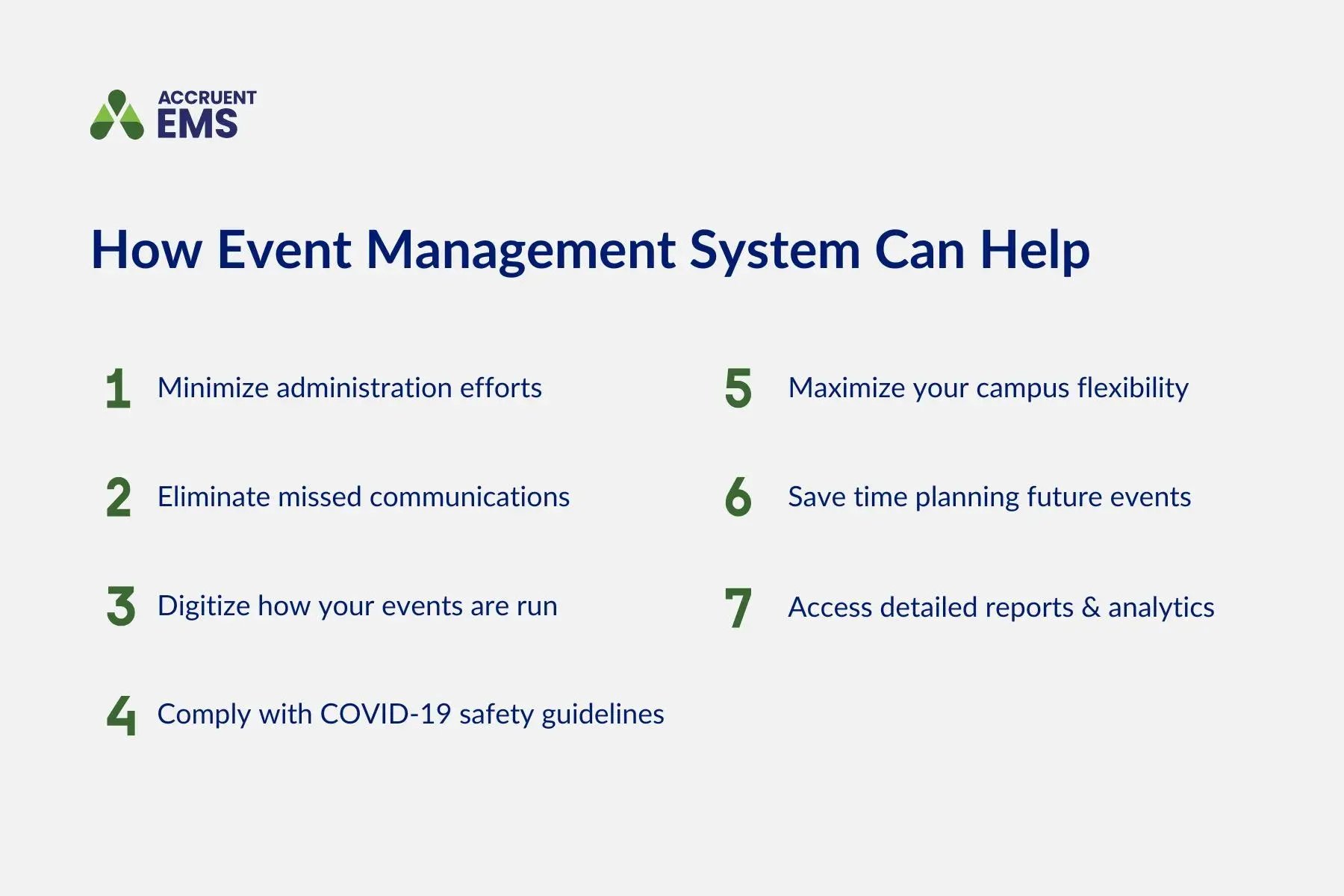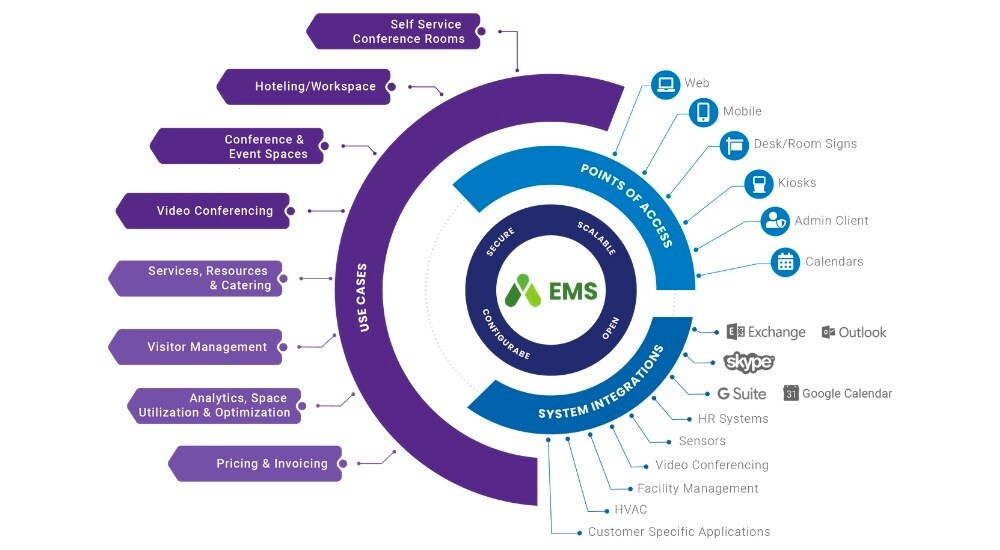
Streamline Your Events with Event Management Software
Discover how event management software can enhance your campus and office events. Learn what an EMS is, why you need one, key features to look for ...
Solutions
Workplace Management Solutions
Real Estate Management Solutions
Maintenance Management Solutions
Energy Management Solutions
Engineering Document Management Solutions
Asset Management Solutions
Automate campus scheduling for classes, meetings, and exams with our EMS software.
Plan and manage conferences effortlessly with EMS software to impress guests and streamline operations.
Boost workplace flexibility and maximize space use with seamless desk and room booking.
Organize workplace or campus events smoothly, creating memorable experiences.
Optimize workspace, manage allocations efficiently, and reduce costs with our space management solutions.
Deliver projects on time and within budget by improving communication, collaboration, and efficiency with our software.
Streamline lease accounting for ASC 842, IFRS, and GASB compliance.
Manage leases efficiently by tracking key dates, analyzing costs, and ensuring compliance.
Centralize data and analytics for better insights, faster negotiations, and revenue growth.
Centralize facility and asset maintenance, automate work orders, and ensure compliance with our CMMS software.
Extend asset life, reduce downtime, and prevent costly repairs with data-driven monitoring.
Prevent equipment failures and extend asset life by detecting and addressing issues early.
Make sustainable, cost-efficient energy decisions by monitoring and optimizing power consumption.
Remotely monitor and control equipment with real-time data to predict issues, boost efficiency, and reduce downtime.
Easily share and collaborate on documents, creating a single source of truth for engineers and contractors.
Manage and analyze assets across their lifecycle to schedule maintenance, reduce downtime, and extend lifespan.
Improve visibility, automate work orders, and ensure compliance for efficient facility and asset management.
Resources
Browse our full library of resources all in one place, including webinars, whitepapers, podcast episodes, and more.
Support
Looking for access to technical support, best practices, helpful videos, or training tools? You’ve come to the right place.
About Accruent
Get the latest information on Accruent, our solutions, events, and the company at large.
An event management system allows users to access and manage all aspects of an event in one place, including registration, planning, reporting, and more.
An event management system (or event management software) is a digital tool that streamlines the planning, organization, and execution of events. It encompasses a range of features such as event registration, ticketing, venue selection, scheduling, attendee engagement, and post-event analysis. By using event management software, event organizers can simplify their tasks and more efficiently manage logistics, communicate with participants, and analyze data to enhance future events. Not to mention, event management software offers a centralized platform for coordination, reducing manual efforts and increasing precision, ultimately enhancing the overall success and efficiency of events. Accruent EMS is event management software that provides you all of these key features to help ensure your next event goes off without a hitch.

A truly comprehensive event management system will allow users and organizers to access and manage all aspects of an event, including registration, marketing, engagement, integrations, physical planning and preparation, reporting and analytics, and more.
On college and university campuses, events are happening all the time, whether student- or faculty-focused, and often through in-house or third parties and vendors. When these events take place, it is critical to use an event management system that offers full control and planning capabilities to ensure activities happen on time, in accommodating spaces and keeping in mind the safety of every attending. Comprehensive event planning software will allow campus event planners to book large-scale events, communicate with service providers, and maintain a single source of record for repeatable, measurable events.
Event planners on university campuses must also consider student and faculty safety, especially now as large gathers have become more complicated in the wake of COVID-19. An event management system provides connection to campus police and other security factors to keep attendees safe and control crowds. An event management system can also help formalize sanitation procedures, ensure socially distant spacing, and more.
An Event Management System provides campus event planners a flexible, fully integrated solution to simplify the event management process and keep your customers, faculty and students happy, while maintaining important reports and data for making real estate and future planning decisions.
An event management system allows you to:

An Event Management System minimizes the steps needed to manage your events, creating a much more efficient administrative process. This way, event planners can focus more on the details, without getting lost in administrative tasks. For example, the University of Vermont used EMS Event Planner Software to reduce phone calls in their event services office by more than 50, allowing their staff to spend more time maximizing their space and event planning on campus.
Poor communication is the leading cause of event failures or mishaps. An event management system facilitates instant communication between planners and providers and makes it easier to share timely information to students, faculty, catering, operations, and more. Automated notifications and mobile capabilities help keep everyone informed of changes and plans, eliminating event disasters due to miscommunications.
The world continues to move toward a digital-first mindset. By bringing your campus into the digital age with event planning software that’s mobile and agile, you ensure that the platform scales with you and provides multiple digital, accessible touchpoints for users. In a comprehensive event management system, you can digitize contracts, registrations, request forms, reports and more.
Student safety is critical to successful events during the COVID-19 pandemic. Whether you need to enforce mask guidelines, maintain social distancing, schedule sanitization needs, or any other safety measures, event planner software can bring all these tasks into one comprehensive place.
An event management system provides hardware and software integrations for campuses, including integrations with HVAC, catering systems, Student Information Systems (SIS), scheduling tools like Microsoft Outlook, facility management services, and more. These integrations allow event planners to streamline event in virtual, hybrid, and in-person contexts.
Effective event manager software should allow users to build repeatable processes and procedures to help maintain event success. With an effective event scheduling software, you can create repeatable steps, save forms, clone reservations and details like A/V, save user preferences, and more. This helps eliminate time-consuming manual processes for future events.
Event manager software should help users understand the successes and failures of events to improve processes and keep customers (students, faculty, vendors, attendees) happy. Detailed reporting on every event you run helps you continuously optimize your events and schedules, and you can make better space management decisions in the moment using real-time event data.
For example, the University of South Albama uses EMS event planner software to track all their events. They were able to avoid serious mishaps and double bookings by catching events that were "scheduled" to happen but were never entered in their EMS system, all through real-time observations and reporting. Analytics help event planners better understand how their spaces across campus are being used.
With EMS, being able to constantly know the status of all the overall event and all the components within the event at one time - having that complete visibility has been a big benefit."
— Kathleen Rydelek, Facilities Management Services, Rochester Institute of Technology
In order to provide the best assistance to campus event planners, comprehensive event planning software must offer:

Custom processes in your event management system allow for designing and publishing online request forms, requiring approvals or additional information, and custom fields for different events to make sure you get all the information you need.
Event manager software should possess a simple interface to make event updates and tracking easy to maintain. Users should be able to make changes to events, including time, date, status and services needed, without having to cancel and redo an entire reservation in the system.
Access to a library of resources and documentation is critical for an efficient event management system. Planners and users need to be able to attach all relevant services and documentation to any event booking, as well as add comments where needed for easy reference.
A truly comprehensive event management system will need a mobile app that is accessible to users and planners. Students are more mobile now than ever, and in an increasingly online world, event management needs to digitize and become mobile-friendly, including access on smartphones, kiosks, tablets and computers.
Many university campuses already utilize Student Information Services (SIS), facility solutions, video conferencing, and various hardware for HVAC and other monitoring. The ability to integrate with this hardware and software is crucial for a successful, streamlined event management system.
Secure event management software will allow planners to display or hide information based on rooms, status, event type, or user. Security personnel should also have access in order to ensure protocols are being followed for events. Frequent back-ups, data encryption, and security monitoring are crucial to protect sensitive student and faculty information.
Event reporting is essential not only to successful events present and future, but also for space and real state planning. Event manager software that gives you a clear vision of how your space across campus is being utilized for events gives you a better understanding of wasted space, essential space, and where to budget for better real estate in the future.
Effective event scheduling software should be capable of seamlessly managing in-person, virtual, and hybrid events. Fortunately, Accruent EMS provides for all of these key features:
For in-person events, event manager software should enable users to streamline room bookings, allocate resources, and schedule meetings – all while ensuring efficient utilization. Also, users should be able to manage attendees, make catering requests, and reserve equipment for their event.
In the realm of virtual events, event scheduling software should let users schedule online meetings, webinars, and virtual conferences by integrating with virtual meeting platforms, managing attendee registrations, and providing a centralized system for communication and resource allocation.
Event scheduling software should support the coordination of physical and online attendance by allowing for synchronized schedules, managing hybrid meeting spaces, and catering to the needs of both in-person and remote participants.
Accruent's EMS Conference and Event Management Software offers a one-stop shop where users can access every part of event planning and reporting, simplifying the event management process. EMS Event Management Software provides complete planning control along every step of the event management process and ensures secure access to all event information.

Key functionalities:
Managing campus events with an efficient event software solution is critical to the success of your campus, and the happiness of your customers, including students, faculty, vendors, outside attendees, and more. EMS is your one-stop shop for a complete, end-to-end event management system.
The University of South Alabama faced challenges with with inconsistent scheduling due to departments using separate systems, causing miscommunication and double bookings. To solve this, they implemented the Accruent EMS event management system and here are what achieved:
The University of Vermont faced inefficient, time-consuming event planning due to decentralized scheduling and siloed departments. To address this, they adopted the Accruent EMS event management system and here are the results:
Our experts can help you get started with the top-rated EMS event management software today. Contact us to learn more and see a demo.
An EMS allows users to book venues, track attendees, send notifications, and automate workflows through a web-based or mobile platform. It integrates with calendars, CRM tools, and communication channels to ensure smooth event execution from start to finish.
When selecting an EMS, look for easy-to-use interfaces, integration with existing tools, automation features, real-time reporting, and customization options. A good system should support both in-person and virtual events while offering flexible booking and attendee tracking.
An EMS provides real-time occupancy data, tracks cancellations, and analyzes booking trends to optimize room usage. Organizations can identify underutilized spaces and adjust event setups accordingly.
Discover how event management software can enhance your campus and office events. Learn what an EMS is, why you need one, key features to look for ...
With meeting room booking system, employees can check real-time availability, book meeting rooms, and manage equipment, teleconferencing, and ...
Campus events are multi-department affairs. See how sharing access to management systems across events, facilities, and other teams can be a viable ...
Subscribe to stay up to date with our latest news, resources and best practices